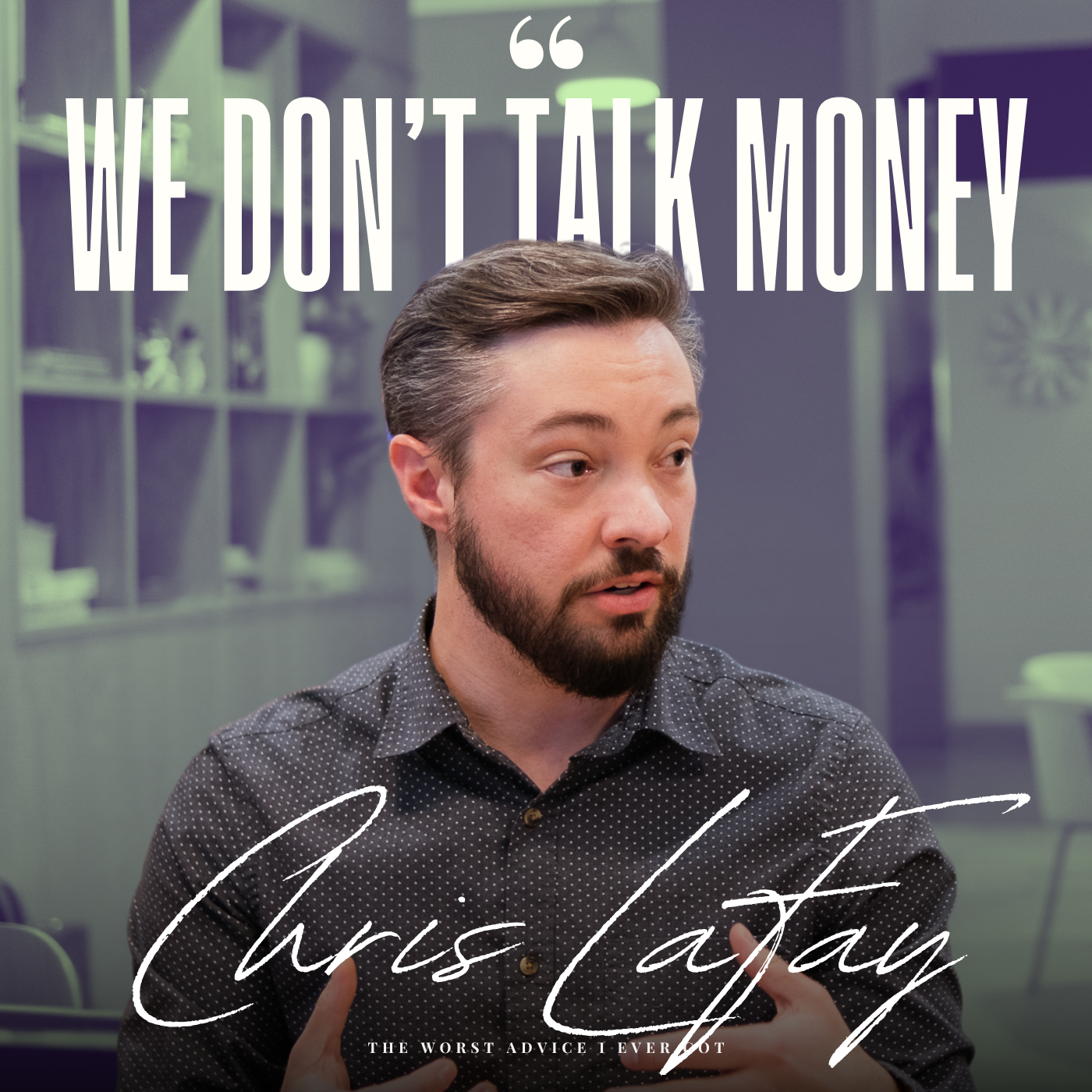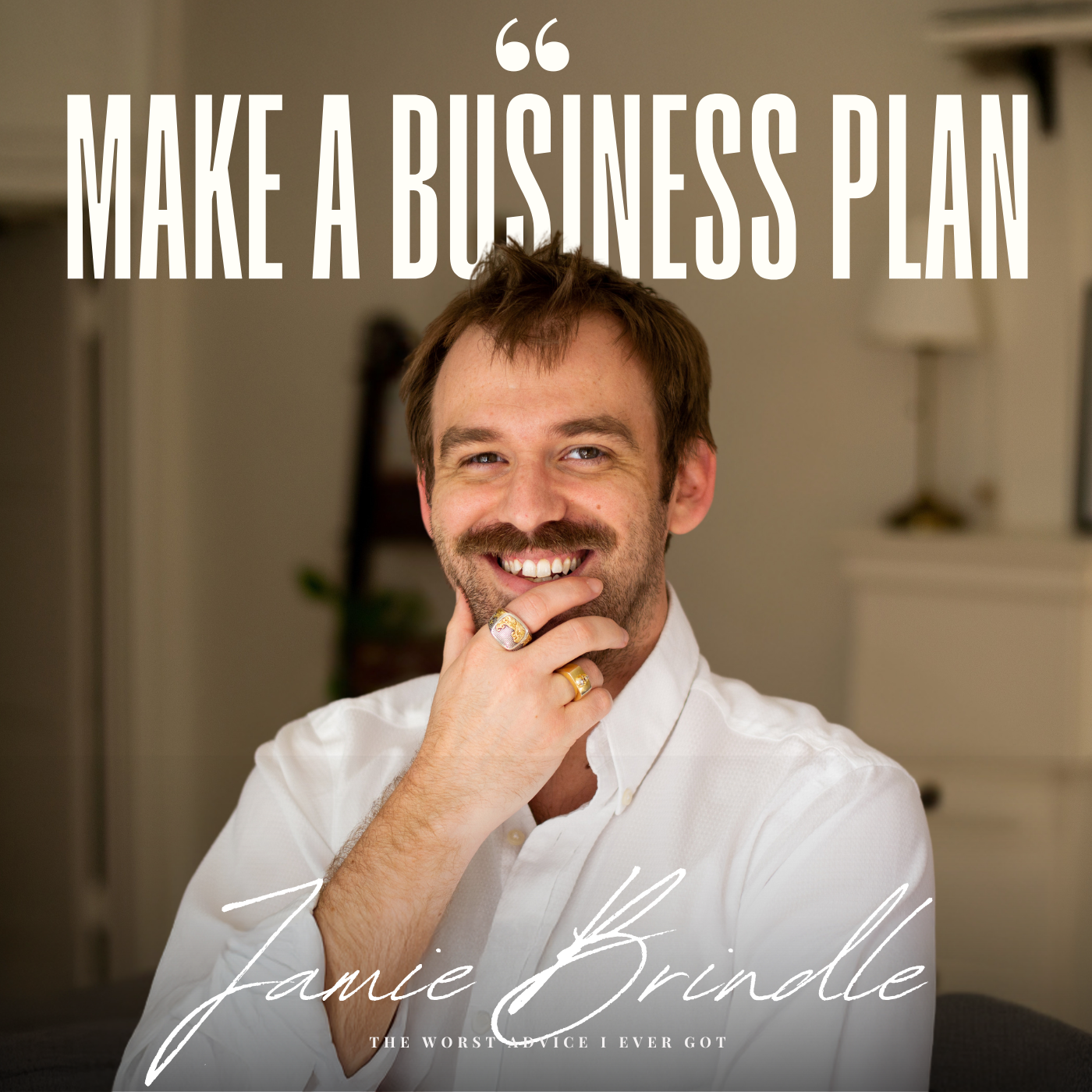Episode Transcript
[00:00:00] Speaker A: Foreign.
[00:00:05] Speaker B: Welcome to another episode of the Worst Advice I Ever Got. I'm your host Sean Taylor, along with my producer, jb and today our guest is Chris Le Fay. Chris is the founder and CEO of Classic City Consulting, a web development agency that helps growing companies scale with smarter systems and cleaner tech. He's also a calm, thoughtful leader who's built a culture rooted in clarity and trust. In today's episode, we dig into a piece of advice Chris picked up early on, something that's often treated like common sense in both business and Southern culture. What happens when you avoid the most uncomfortable conversations? And what if facing those head on is actually where the growth is? Let's jump into it. Hey, Chris, thanks so much for joining us today.
[00:00:47] Speaker A: Thanks for having me today. I'm excited for the conversation.
[00:00:51] Speaker B: Yeah, well, let's jump right in. What's the worst advice you ever got?
[00:00:55] Speaker A: The worst advice I ever got is we don't talk about money.
[00:00:59] Speaker B: Oh, juicy. Okay.
Was it a specific person that gave you that advice or was this just something you heard generally through the ethos? Tell me more.
[00:01:08] Speaker A: So a little bit of both. It was really more just kind of hearing things out in the world. I've run my own business ever since I've been in middle school.
My family, we have a couple of entrepreneurs in the family as well.
And there's always been this stigma around whether it is salary or business finances and expenses and things along those lines to where you just don't talk about it. It's like this unspoken rule, I feel like, where if you start talking about it, you're immediately you're bragging about something or you're lowering yourself like there's this weird, there's no middle ground of using it as a point of conversation to really be helpful. We could help each other out and open up deep conversations.
All the better.
[00:01:57] Speaker C: When you say we don't talk about money, who's the we?
[00:02:00] Speaker A: The we is in my world, I live in a lot of business owners. People either are kind of at that top level and where they're like, if I start talking about money, that's going to put a target on my back. Those types of things. Or for the smaller businesses that I know, you don't talk about money because you feel like you just haven't made it yet.
And when you start opening up conversations around in the business world about how you've been making money, how much it's costing you to actually make that money, where are the pros and cons? How did you go about your business journey Finances are that foundational component and that's why talking about finances is so important.
[00:02:44] Speaker B: If talking about is so important, why are we conditioned not to do it?
[00:02:48] Speaker A: That's a great question. I honestly have no idea why. I know that when I was growing up, I had no idea the type of money that my mom, mom made, my dad made, my brother made. My brother's older than I am. I had no idea about any of these things.
And I feel like there's this immediate gut reaction when you start talking about money and salaries and things along those lines to immediately or accidentally put somebody up on this pedestal that they don't necessarily belong on. It's this weird, this value that we've created around the amount of money that you've made either is going to turn people off completely or excite people. There's like this not, there's not this middle ground of using it as really the common through line to talk about the types of challenges like. Let, let me give you, let me, let me give you an example of something that's happened relatively recently. I was talking to a buddy of mine, he's not a business owner. He was talking about some struggles that he was having in his personal finances and things along those lines. It was talking about things very vaguely and he was trying to debate whether or not he wanted to continue doing the work that I was going to, that I had already given him. And I sat down with him, I just straight up asked him, I was like, okay, right now, what are you making from your full time job? X what are you making from this part time work that you and I are doing right now? Why? And the amount that he was making from this part time work, it's about 50% of his salary. I'm like, tell me now when you're thinking about it in relative terms, there's a little bit of extra work that you're doing on the side. It's bringing you a 50% bump to what your household is bringing in right now. Is that extra effort worth it? And at the end of the day, it might not be. And that's okay. It's not a good or a bad thing. But it framed the conversation completely differently for him. And he was able to make a much more informed decision because he got that outside perspective that he was missing. And because we don't talk about our personal finances. This guy was sitting there trying to figure out whether he wanted to do an extra five or six hours of work a week to make this extra money and not putting it into the bigger Perspective of how much that's actually impacting his family's financial long term picture.
[00:05:10] Speaker C: Yeah. Without talking about it, you can't get to the answer. If you don't talk about the money, you're just talking around the answer.
[00:05:15] Speaker A: Exactly. And as soon as we started talking about the money, that clarity that was gained just by a single 10 minute vulnerable, very vulnerable conversation gave him clarity to help structure what his family needed.
[00:05:31] Speaker B: Sounds to me like people again going back to their condition not to talk about money. Maybe they're uncomfortable with it. Like how do we get people comfortable?
[00:05:39] Speaker A: I think getting comfortable. I've been testing this out. I've been meeting with other agency owners, honestly over the last year, year and a half, folks that I don't know very well. I don't have like a deep rooted connection with them to start off with and trying to make it more of a normal thing to talk about. And so what I've done is I've started talking about challenges that I've had in my own business, like where we're at financially, the types of decisions we had to make over the course of the past year, how that impacted revenue and expenses and dive straight in.
And it's been really interesting. The folks who have reciprocated with the same level of transparency around their business, those are the ones that have reciprocated a lot deeper conversation across the entire time that we got together and that we've had multiple conversations. The folks that then took that and pivoted into the advice category of here's something that I would think that you should might do.
Not founded in experience, not founded in actual data are the conversations that lasted 45 minutes and we have not had any further conversations. It's just about making it more of a commonplace and using it as that foundation.
[00:06:54] Speaker B: So how do we address the natural tendency to resist talking about Monday, like if you want to talk about it, to deepen a relationship and I just say, Chris, I'm not interested in doing that. What are some, what's some advice you would give to get me to open people up to being more transparent about it?
[00:07:11] Speaker A: Start small. I've realized recently that I'm an external processor. I talk to people, I get my thoughts and my ideas out.
I'm also a very open human being as well. I give trust very easily to other people, especially if new people come into my life through folks that I trust. And so I've not really had to climb that hill. And so where I would personally start and thinking more around the lines of business owners Is how many people in your life do you truly open up to? Not necessarily specifically around finances to start off with, but those other deeper areas of either business or personal.
How many of these folks do you have in your life that you have this great two way relationship that is not just give, give, give. There's this nice mutual give and take. And how deep are those conversations?
To add a little, to paint a little bit of a picture around this. I'm in a group here in Atlanta called Entrepreneurs Organization. EO Atlanta does something called a forum. And we're in a group of four to eight people. And one of the tenants of EO that I've taken back to the rest of my life is the concept of experience sharing. You get together these once a month times and you talk about stuff that's happening at the business level, the family level, personal level. As you're discussing these different things that are happening, as you're listening and you're providing feedback and you're talking, you're not giving advice. Advice is typically one sided. That's the easy part. It's like, oh, hey, you should do this. Boom, done, put a little band aid on it, fix it. Rather than do that, talk about experiences that you've had that are similar, dive into the challenge that you had, talk about how you potentially tried to solve it in one or two different ways, and then what was the actual outcome of that? And I have found as I have leaned more into sharing of my experiences, the more open and honest and vulnerable I've ended up becoming.
[00:09:18] Speaker B: So, Chris, you think these structured forums, full transparency and openness out versus the one on one. I would think that maybe starting one on one might be easier than being in a group, but you're, you're telling a little bit of the opposite there.
[00:09:31] Speaker A: I like one on one. One on one is my jam. I do it all the time. It's my favorite thing. I think what helped from a group perspective is that within this particular example, everybody went into that room with the exact same mindset, full transparency. And what's talked about in the room stays in the room. That gives a little bit more of an openness to be able to do that, but without that kind of that banner. I do, actually, I do completely agree with you. One on one.
As you're starting off, working on becoming more transparent and talking about these deeper things, one on one has that ability to build that, that deeper connection a lot faster.
[00:10:12] Speaker C: That's what we do on the podcast, Sean.
[00:10:14] Speaker A: Yeah.
[00:10:15] Speaker C: You know, talk about experiences. We don't talk about advice. Like, no, this is the worst advice he ever got.
[00:10:20] Speaker A: Exactly.
[00:10:22] Speaker B: My way of looking at it is there is a primary reason why people don't want to talk about money. How do we get to the core reason behind each person's basis for not wanting to talk about money? Can't we draw that out somehow?
[00:10:33] Speaker A: That's why I highly value deep conversations with people.
I don't. I don't do shallow conversations at all. I don't do. Let's talk about the football game that happened this week and all this jazz. I. I can. I can rattle off about sports as long as anybody else, but it. It doesn't excite me. Deep conversations for each person is going to vary. We like being asked questions, but I don't know if we're asking the right types of questions to get to those deep relationships at the end of the day. Like, there's this intentionality that comes when you're willing to ask really good questions of people and not be worried about the responses that you get. But eventually you get to that point to where nothing is off limits.
[00:11:20] Speaker B: Money seems to be a qualifier for inclusion or exclusion. Right. Status or whatever. Can't we get rid of that?
[00:11:27] Speaker A: I would love to get rid of that. There's always this imposter syndrome, right? Like, there was a time where I made 50,000 a year. There was a time that I made 200,000 a year, there's a time that I made a million dollars a year, so on and so forth.
And at each of those stages, I always felt like I wasn't as good as insert this other person, this other agency owner that I looked up to. But it doesn't matter. Every business is created differently. Success is defined differently. And that right there, I think, is really one of the key turning points is money does not determine success.
And we have this mindset that based on your W2 income or your annual revenue as a company or the number of companies that you own, that is your signifying of success. And if I, as this tiny little guy over here doesn't hit as many of these check boxes, then you're way above my league. And I don't deserve to talk like your time is more valuable than mine.
There are these invisible walls between that and the idea is to break them down. We're all sharing in life together. We're all going through similar experience together.
Everybody has valuable experiences.
[00:12:44] Speaker C: I'm reminded of a lyric from Everclear. To date myself. People that say, you know, money is the root of all the kills, they've Never felt the joy of a welfare Christmas. As somebody who's fairly successful in having money, is that easier because you have money to talk about money, or if you weren't, would this still be bad advice?
[00:13:04] Speaker A: I would hope to say that my mindset would be exactly the same whether or not I ran my agency or not. I can't. I don't. I don't have that experience. I don't know what the answer to that would be. But what I will say to that is, out of all the folks that I've talked to and have had deep conversations with, doesn't matter.
At the end of the day, breaking through that barrier of getting folks to talk about it has opened them up for pretty much almost any type of conversation out there. I wish it was more normalized. I really. I think I. I think I danced around your question on accident. I have the gift of gab. I have the gift of being able to talk.
It's great. When there's a podcast, there's a good West Wing quote, if you ever watch. I don't remember the specific words.
There's a. The President Bartlett says, why use five words when will do the trick? And I'm like, that's me right there.
No matter your income, what you bring to the table, you have value in those experiences. By being able to dive deep and talk about this type of stuff, about finances, unlocks the door for a million other deeper conversations that can be had and really deep relationships.
[00:14:24] Speaker B: Everybody has problems no matter how much money they have. And aren't our problems somewhat similar, irrespective of money?
[00:14:31] Speaker A: They really are, actually. I'll give you an example of that. I was. I just did a walk and talk around Piedmont park recently, and this guy who's running a much larger agency than me, has these extraordinarily simple problems that he wanted to get my 2 cents on and my experiences that I've had in this. He wasn't asking for my advice. He know. He knew based on our other conversations and because we have shared these experiences, I had some experiences that he hasn't had yet.
I wanted to give my experience to this person. I wanted to help him out. I wanted to share the things that I screwed up on so that he doesn't screw up on the same things.
And a lot of that stemmed from those initial conversations where we dove deep pretty much from day number one. And it's blossomed into a fantastic relationship and a wonderful person I can go and talk to pretty much about anything. And honestly, we wouldn't have gotten There if we didn't talk about money, maybe.
[00:15:34] Speaker B: This conversation with Chris has taken me back to last season. Spoke to Ryan Heckman. You know, his worst advice he ever got was be successful and then give back. And it makes me wonder whether or not people are willing to talk about money, but only after they've achieved some level of success. Is that a big part of the problem, Chris?
[00:15:53] Speaker A: It's the whole thing about it's imposter syndrome. Dictionary definition right there. So in that case, what is success defined as? Is success 500k a million, 2 million, or is it 50,000?
Like, there's no direct line of what ties success to a dollar amount.
[00:16:15] Speaker C: You know, when I was growing up, the don't talk about money was a thing because it's rude. That was the whole thing. It's all, It's a, it's a politeness thing. So is that wrong?
[00:16:25] Speaker A: Depends on the angle that you're coming at it with. Like, if you're coming at it, like, I've talked to plenty of people who are like, look at me, this is the pedestal in which I stand on. If you're using that as your like, self created thing to like lift you up above everybody else, there's probably some other problems happening.
[00:16:42] Speaker B: What about the aspect of security? Right. Money creates security, right? So how does security come into play here? You're talking about. We've talked a lot on this episode about how money and success are correlated, but what about the aspect of security and feeling that I don't have it when we talk about money?
[00:17:03] Speaker A: Our business did not have a lot of money. It was a really bad year for us. And last year was extraordinarily stressful.
When I went out and actually opened up myself, opened up my books, open up my business, open up pretty much anything that people were interested in looking at and said, here's what I'm going through right now. The amount of experience sharing that folks gave to me to help me navigate those waters that I've never been in before gave me immense clarity. If I were to show you my profit and loss statement, you could see very tangibly when I had those conversations month over month, you'll see this tangible difference of, oh, this is where it was going. Oh, there were some changes made here.
[00:17:51] Speaker B: When you revealed your insecurities, it allowed for the conversation to happen, which allowed for change.
[00:17:56] Speaker A: Exactly. And if I wasn't willing to have that conversation or any of these, those conversations, plural, you're just sitting alone in your own silo by yourself, wallowing, well.
[00:18:07] Speaker B: I can't thank you enough for being willing to have the conversations today to be willing to talk about money, because I think our listeners have gained a tremendous amount from your willingness to talk with JB and I about money. So thank you so much for joining us today, Chris. I really appreciate it.
[00:18:23] Speaker A: Thanks for having me. It was a pleasure, jb.
[00:18:26] Speaker B: This one surprised me because we don't talk about money. Sounds like advice we've all heard. But Chris wasn't just talking about dinner table manners or don't ask someone their salary.
[00:18:37] Speaker C: Yeah, right. He was saying, you know, when you take money off the table entirely, you're cutting yourself off from clarity and connection and actual problem solving when you're having a conversation with somebody.
[00:18:47] Speaker B: Exactly. You said if you don't talk about money, you're just talking around the answer. And that's. That's true. It's not just in business, but in life. We dance around what we really need to say and then wonder why. Why we feel stuck.
[00:19:02] Speaker C: And what I liked is how Chris didn't make it about, like, flaunting success. He's like, you know, I had a bad year, and I was struggling. And then the moment I started opening up about it and being honest about it and talking to people about money, the people showed up with real experiences and real help.
[00:19:16] Speaker B: Yeah, that was the shift. Not advice, not judgment. Experience and sharing experience.
It turned conversations into collaborations. And. And that doesn't happen if everyone's pretending everything's fine.
[00:19:29] Speaker C: Yeah, it doesn't happen if you think your value is tied to your revenue either. You know, he said money doesn't define success, but not talking about it, he said, that can block you from ever getting there.
[00:19:39] Speaker B: Yeah. So for me, this. That's. This really wasn't an episode about money. It was about truth, transparency, and. And. And how avoiding one topic can keep you from solving the thing that's actually holding you back.
[00:19:52] Speaker C: Yeah. I mean, if you're feeling stuck, maybe it's not the business that needs fixing. Maybe it's the conversation about that business.
[00:19:58] Speaker B: Yeah, that's well said. That's well said.
Another episode with a guest who gave a great story and left us thinking, wow, we should really, really think about what this individual went through and what I can glean from this. And I think that's what we're giving you in each of our episodes with each of our guests. So be sure to join us next week on the worst advice I ever got.



